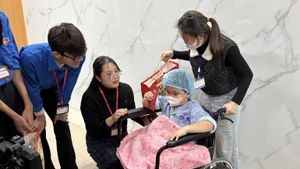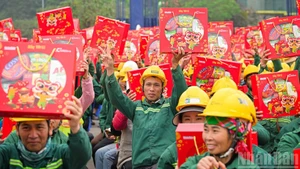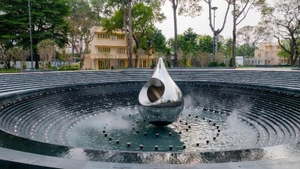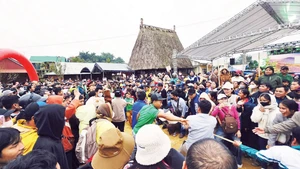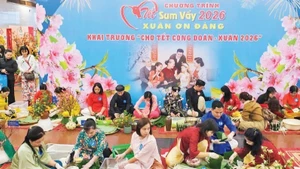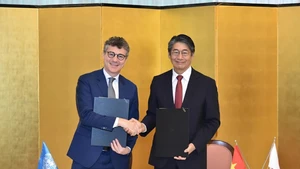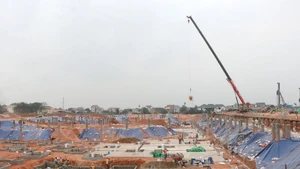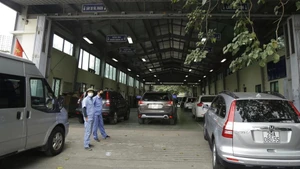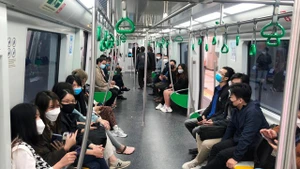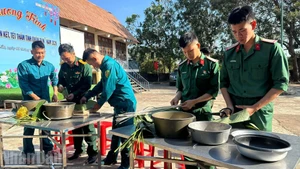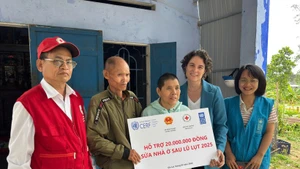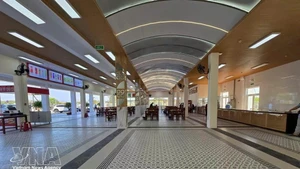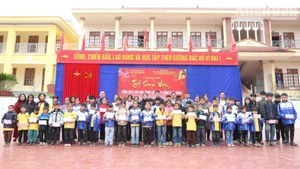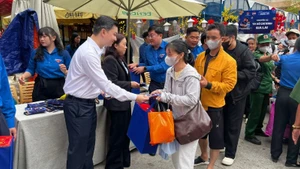Discipline, responsibility and consistency
The Party Committee and High Command of the Border Guard Force have incorporated the implementation of Directive No. 05-CT/TW and Conclusion No. 01-KL/TW of the Party Central Committee and the Army on studying and following Ho Chi Minh’s thought, morality and style into their regular leadership resolutions of party committees at all levels. They have led and directed the prompt issuing of plans and guidelines to ensure synchronised and systematic implementation in all agencies and units.
Colonel Nguyen Xuan Toan, Head of the Political Department of the Border Guard, shared that the Party Committee has issued plans to further promote this movement of studying and following Ho Chi Minh’s thought, morality and style throughout the force, in association with the ongoing campaigns launched by the Central Military Commission’s Standing Board on “Promoting tradition, dedicating talent, deserving to be Uncle Ho’s soldiers” and “Promoting tradition, dedicating talent, deserving to be Uncle Ho’s soldiers in the new period.” The Party Committee has also directed all units to concretise five standards of “Uncle Ho’s soldiers” in the new period for officers, Party members, and soldiers to strive towards in their daily work and self-improvement.
Party committees and organisations at all levels of the border guard force have strengthened communication on studying and following Uncle Ho’s example in close association with the implementation of resolutions and conclusions of the Party Central Committees on building and rectifying the Party and political system. Study and dissemination have been integrated into weekly and monthly activities, as well as through cultural and artistic programmes, discussions, internal newsletters, social network, and visual displays such as posters and banners.
Many Party organisations have applied creative and effective initiatives to promote the noble qualities of “Uncle Ho’s soldiers” and prevent individualism through campaigns such as “Work with responsibility, lead by example,” “Model party cells,” and “A lesson from Uncle Ho each day.” So far, 100% of officers and soldiers have registered personal commitments to self-discipline and moral training according to their assigned duties, contributing to implementing emulation movement and the campaign the “Promoting tradition, dedicating talent, deserving to be Uncle Ho’s soldiers in the new period”.
According to assessments of the Party Committee and High Command of the Border Guard Force, the past ten years of implementing Directive No. 05-CT/TW have significantly transformed the awareness and sense of responsibility among leaders, commanders, Party members, and soldiers. These efforts have yielded practical results, helping to build a clean and strong Border Guard Party Organisation and model agencies and units that successfully fulfil their assigned political missions.
Creative and effective models
During the implementation process of Directive No. 05-CT/TW, many creative and effective models have emerged in the Border Guard Force, the model particularly helps local people implement poverty reduction, natural disaster prevention, and post-storm recovery.
The border guard force has actively participated in major national programmes such as the new-style rural development programme, the education target programme for mountainous, ethnic and disadvantaged areas, and the legal education and communication project. The High Command has mobilised resources and sought support from sectors and organisations to provide policies, mechanisms, and funding for border areas. At the grassroots level, border guard stations have carried out their support suitable with local conditions and needs.
To join hands to assist difficult circumstances, the High Command has implemented key programmes, including: the “Accompanying border women” programme, which has supported women in 210 border communes facing difficulties in economic development and livelihood stability; the “Border Shelter” programme, which has provided 8,600 houses to families without stable housing; the “Cow for the poor in border and island areas” programme, which has donated over 30,000 cows to help local people escape poverty; and the “Supporting children to school – adopted children of border guard stations” programme, which helps nearly 3,000 Vietnamese students and about 200 poor students from Laos and Cambodia, as well as directly takes care of 338 orphans annually.
In times of hardship and danger, the activities to study and follow Uncle Ho’s example shine even brighter. In 2024, when Storm No. 3 caused severe flooding in Lao Cai Province, many border guards’ homes were submerged. However, with the spirit of “saving people is a sacred duty,” they set aside personal loss to rescue local people. Major Duong A Lieu, from the Administrative Control Team of Bat Xat Border Guard Station, shared that despite the rising floodwaters and constant risk, he and his comrades persevered, helping families move elderly people, children, and belongings to safe places.
More recently, Storm No. 10 brought heavy rain, flooding, and landslides in the border areas of Tuyen Quang Province. On October 1, a landslide in Ma Lau A Hamlet, Lung Cu Commune, destroyed six houses and buried four members of a single family. Right after receiving the report, Lung Cu Border Guard Station immediately mobilised officers and soldiers to the scene to support rescue operations. Thanks to their tireless efforts, all victims were found by 10:30 a.m. on the same day. Along with rescue operations, Tuyen Quang Border Guard officers worked with local authorities to provide assistance and emotional support to affected families.
Through their meaningful and compassionate deeds — which are deeply rooted in President Ho Chi Minh’s thought, morality and lifestyle — border guards have become a steadfast source of support for ethnic communities in border regions, embodying the image of the “green-uniformed soldier” as both a doctor and a teacher of the people.

